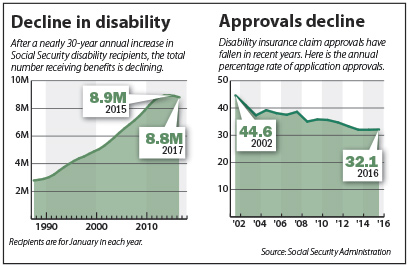Disability benefit applicants as well as those receiving the benefits need to stay abreast with Social Security updates that appear from time to time. The same is true of social security disability attorneys and companies like us that provide medical record review for attorneys. One of the latest developments in this regard is the elimination of the “treating physician rule” via new regulations that went into effect on Monday, March 27. This regulation may make it harder to file a disability claim with the Social Security Administration.
The “treating physician rule” requires the administrative law judge to give greater weight to the opinions of treating physicians than to the opinions of non-treating physicians when evaluating the medical evidence supporting a claim for disability benefits. Medical records review or evaluating the medical evidence is a very significant step when processing disability applications because it is only via a comprehensive assessment of the medical records that the disability can be determined. In the absence of significant contrary evidence, the treating physician’s diagnoses and findings are binding on the administrative law judge. The logic behind this rule is that a claimant’s treating physicians are most able to provide a detailed, all-encompassing picture of his/her medical impairment. The treating physician can provide a unique perception to the medical evidence that cannot be obtained from objective medical findings or from hospitalizations, or consultative examinations.
The elimination of this rule could make it harder for people to prove that they are entitled to disability benefits. Critics point out that the rule changes may reduce transparency, and allow administrative law judges to attach equal or greater weight to the medical testimony of healthcare sources that may not have treated the claimant. The revised rule says that the revision has been introduced to state that adjudicators will articulate how they consider medical opinions from all sources, irrespective of whether or the medical source is an (acceptable medical source). The SSA also will not give added significance to disability determinations of other government agencies such as the Department of Veterans Affairs. According to the SSA, the new rules are designed to “reflect modern healthcare delivery,” though its impact on benefits paid is unclear.
The number of people receiving benefits has declined for the first time in almost 30 years, as the SSA points out.
- The 8.89 million people receiving SSDI in January 2016 was the first instance that the number of people receiving the disability benefits fell year over year since 1988.
- In 2017, this trend continued and the number of payees fell to 8.79 million in January, the lowest level in almost five years.
- The annual applications for SSDI benefits also declined after reaching a peak at 2.93 million in 2010.
- The irony is that fewer claimants are being approved for benefits in spite of this decline.
- In 2002, 44.6% of applications were approved.
- Approval rates have declined since 2002, with the rate of approval approximately 32% since 2014.
Observers in the field say that the new regulations may possibly affect some benefit approvals though it is not clear to what extent they may have an impact. They also point out that the one thing least likely to change in disability cases is the time it takes for initial denials to be appealed. According to Lisa Ekman, director of government affairs for the Washington D.C based National Organization of Social Security Claimant’s Representatives, at present there are approximately 1.4 million people waiting for a disability hearing. This delay is especially gruelling for those with no income and those who are unable to work. However, other experts say that the administrative law judges are doing the best they can with the available resources.





